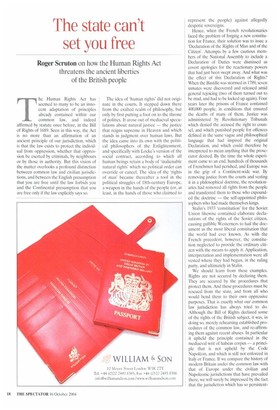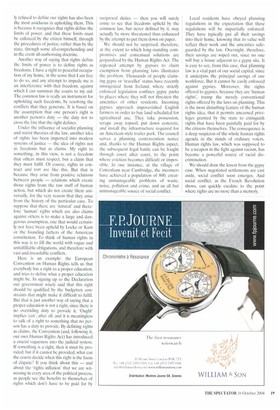The state can't set you free
Roger Scruton on how the Human Rights Act threatens the ancient liberties of the British people
The Human Rights Act has seemed to many to be an innocent adaptation of principles already contained within our common law, and indeed affirmed by statute once before, in the Bill of Rights of 1689. Seen in this way, the Act is no more than an affirmation of an ancient principle of our jurisdiction, which is that the law exists to protect the individual from oppression, whether that oppression be exerted by criminals, by neighbours or by those in authority. But this vision of the matter overlooks a profound distinction between common law and civilian jurisdictions, and between the English presumption that you are free until the law forbids you and the Continental presumption that you are free only if the law explicitly says so.
The idea of 'human rights' did not originate in the courts. It stepped down there from the exalted realm of philosophy, but only by first putting a foot on to the throne of politics. It arose out of mediaeval speculations about natural justice — the justice that reigns supreme in Heaven and which stands in judgment over human laws. But the idea came into its own with the political philosophers of the Enlightenment, and specifically with Locke's version of the social contract, according to which all human beings retain a body of 'inalienable natural rights' which no political order can override or cancel. The idea of the 'rights of man' became thereafter a tool in the political struggles of 18th-century Europe, a weapon in the hands of the people (or, at least, in the hands of those who claimed to represent the people) against allegedly despotic sovereigns.
Hence, when the French revolutionaries faced the problem of forging a new constitution for France, their solution was to issue a 'Declaration of the Rights of Man and of the Citizen'. Attempts by a few cautious members of the National Assembly to include a Declaration of Duties were dismissed as covert apologies for the reactionary powers that had just been swept away. And what was the effect of this Declaration of Rights? When the Bastille was stormed in 1789, seven inmates were discovered and released amid general rejoicing (two of them turned out to be mad, and had lobe locked up again). Four years later the prisons of France contained 400,000 people, in conditions that ensured the deaths of many of them. Justice was administered by Revolutionary Tribunals which denied the accused the right to counsel, and which punished people for offences defined in the same vague and philosophical language that had inspired the original Declaration, and which could therefore he interpreted to mean anything that the prosecutor desired. By the time the whole experiment came to an end, hundreds of thousands of Frenchmen had perished, and Europe was in the grip of a Continent-wide war. By removing justice from the courts and vesting it in a philosophical doctrine, the revolutionaries had removed all rights from the people and transferred them to those who expounded the doctrine — the self-appointed philosophers who had made themselves kings.
Stalin's 1933 'constitution' for the Soviet Union likewise contained elaborate declarations of the rights of the Soviet citizen, causing gullible Westerners to hail the document as the most liberal constitution that the world had ever known. As with the French precedent, however, the constitution neglected to provide the ordinary citizen with the means to apply it. Application, interpretation and implementation were all vested where they had begun, in the ruling party, and ultimately in Stalin.
We should learn from these examples. Rights are not secured by declaring them. They are secured by the procedures that protect them. And these procedures must be rescued from the state, and from all who would bend them to their own oppressive purposes. That is exactly what our common law jurisdiction has always tried to do. Although the Bill of Rights declared some of the rights of the British subject, it was, in doing so, merely rehearsing established procedures of the common law, and re-affirming them against recent abuses. In particular it upheld the principle contained in the mediaeval writ of habeas corpus — a principle that is not upheld by the Code Napoleon, and which is still not enforced in Italy or France. If we compare the history of modern Britain under the common law with that of Europe under the civilian and Napoleonic jurisdictions that have prevailed there, we will surely be impressed by the fact that the jurisdiction which has so persistent ly refused to define our rights has also been the most assiduous in upholding them. This is because it recognises that rights define the limits of power, and that these limits must be enforced by the citizen himself, through the procedures of justice, rather than by the state, through some all-comprehending and in the event all-authorising doctrine.
Another way of saying that rights define the limits of power is to define rights as freedoms. I have a right to peaceful occupation of my home, in the sense that I am free to do so, and any attempt to impede me is an interference with that freedom, against which I can summon the courts to my aid. The common law is really an instrument for upholding such freedoms, by resolving the conflicts that they generate. It is based on the assumption that one person's right is another person's duty' — the duty not to cross the line that the right defines.
Under the influence of socialist planning and statist theories of the law, another idea of rights has been imported into modern systems of justice — the idea of rights not as freedoms but as claims. My right to something, in this view, is not a freedom that others must respect, but a claim that they must fulfil. Of course, rights in contract and tort are like this. But that is because they arise from positive relations between people — relations which create those rights from the raw stuff of human action, but which do not create them universally, for the very reason that they arise from the history of the particular case. To suppose that there are 'natural' and therefore 'human' rights which are also claims against others is to make a large and dangerous assumption, one that would certainly not have been upheld by Locke or Kant or the founding fathers of the American constitution. To think of human rights in this way is to fill the world with vague and unfulfillable obligations, and therefore with vast and irresoluble conflicts.
Here is an example: the European Convention on Human Rights tells us that everybody has a right to a proper education, and tries to define what a proper education might he. In signing up to the Declaration our government wisely said that this right should be qualified by the budgetary constraints that might make it difficult to fulfil. But that is just another way of saying that a proper education is not a right, since there is no overriding duty to provide it. 'Ought' implies 'can', after all, and it is meaningless to talk of a right to something that no person has a duty to provide. By defining rights as claims, the Convention (and, following it, our own Human Rights Act) has introduced a crucial vagueness into the judicial system. If something is a right, then it must be provided; but if it cannot be provided, what can the courts decide when this right is the focus of dispute? If you think about this — and about the 'rights inflation' that we are witnessing in every area of the political process, as people see the benefits to themselves of rights which don't have to be paid for by reciprocal duties — then you will surely come to see that freedoms upheld by the common law, but never defined by it, may actually be more threatened than enhanced by the attempt to put them down on paper.
We should not be surprised, therefore, at the extent to which long-standing compromises and consensual solutions are jeopardised by the Human Rights Act. The repeated attempt by gypsies to claim exemption from planning laws illustrates the problem. Thousands of people claiming gypsy or 'traveller' status have recently immigrated from Ireland, where strictly enforced legislation confines gypsy parks to places where they will not threaten the amenities of other residents. Incoming gypsies approach impoverished English farmers in order to buy land scheduled for agricultural use. They take possession, scrape away topsoil, put down concrete, and install the infrastructure required for an American-style trailer park. The council serves a planning contravention notice and, thanks to the Human Rights aspect, the subsequent legal battle can be fought through court after court, to the point where eviction becomes difficult or impossible. In one instance, at the village of Cottenham near Cambridge, the incomers have achieved a population of 800, creating unmanageable problems of waste, noise, pollution and crime, and an all but unmanageable source of social conflict. Local residents have obeyed planning regulations in the expectation that these regulations will be impartially enforced. They have typically put all their savings into their home, knowing that its value will reflect their work and the amenities safeguarded by the law. Overnight, therefore, their savings are wiped out, since no one will buy a house adjacent to a gypsy site. It is easy to see, from this case, that planning law is a vital part of our social capital, since it underpins the principal savings of our workforce. But it cannot be easily enforced against gypsies. Moreover, the rights offered to gypsies, because they are 'human rights', trump the merely conventional rights offered by the laws on planning. This is the most disturbing feature of the human rights idea, that it permits unearned privileges granted by the state to extinguish rights that have been painfully paid for by the citizens themselves. The consequence is a deep suspicion of the whole human rights agenda in the minds of ordinary voters. Human rights law, which was supposed to be a weapon in the fight against racism, has become a powerful source of racial discrimination.
We should draw the lesson from the gypsy case. When negotiated settlements are cast aside, social conflict soon emerges. And social conflict, as the French Revolution shows, can quickly escalate to the point where rights are no more than a memory.











































































































 Previous page
Previous page